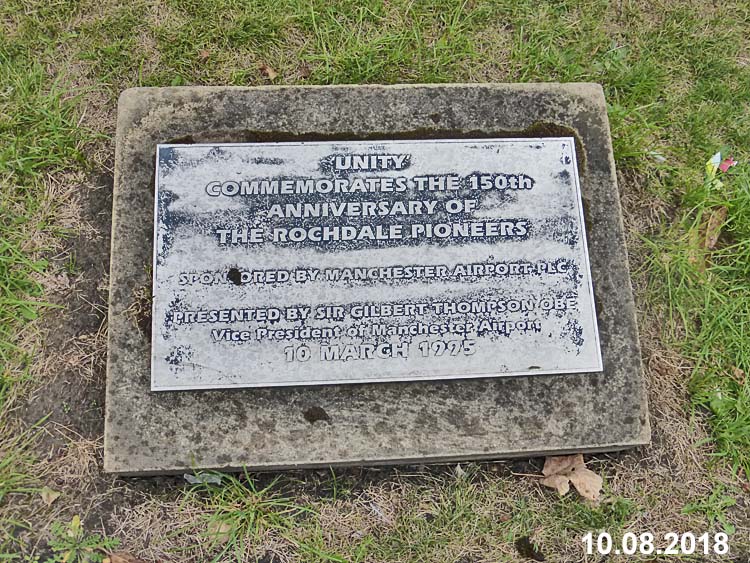As you drive along the
A664, Edinburgh Way, on the outskirts of Rochdale,
Lancashire, you pass under a blue railway bridge. The
sign on the bridge welcomes you to Rochdale "birthplace
of co-operation".
The town is famous around
the world as the home of the co-operative movement, and
it would be reasonable to assume that this is a town
founded on harmony. The truth is that this co-operation
did not come easily. In fact, it was only achieved after
a tumultuous one hundred years of sometimes chaotic
action during which the world order was forever changed.
The so-called "Rochdale Pioneers"
opened their famous Co-operative shop on Toad Lane in
1844.
To observers in the 21st
century, it might be easy to assume that this
represented a stage in the development of the retail
industry. In fact, it was an important step in the
social and political change that was taking place
throughout Europe, and in which the people of Rochdale
can justifiably claim to be leaders.
In the period between 1750
and the opening of the shop on Toad Lane, three major
forces were instrumental in bringing about change in
Rochdale and across the country. These forces were the
Industrial Revolution, the church, and the campaign for
universal sufferage, the right, it must be added, for
every male to vote in parliamentary elections.
As Shakespeare wrote in
Julius Caeser, "There is a tide in the affairs of men
which, taken at the flood, leads on to fortune" and for
Lancashire that flood was the Industrial Revolution and
for some it was a time of great fortune. Rochdale was
forever changed by this tide, but that isn't where its
history began.
The Early Years in the Parish of
Rochdale
Just how old the
Rochdale community is remains to be shown, but under
the name of Recedham it was mentioned in the
1086 Domesday Survey. St. Chad's, the Rochdale Parish
Church, had its first vicar appointed in 1194, but
there is physical evidence that a "church" existed on
the site long before the present one. In 1251 the town
was granted a market charter. Rochdale is indeed a
town of some antiquity.
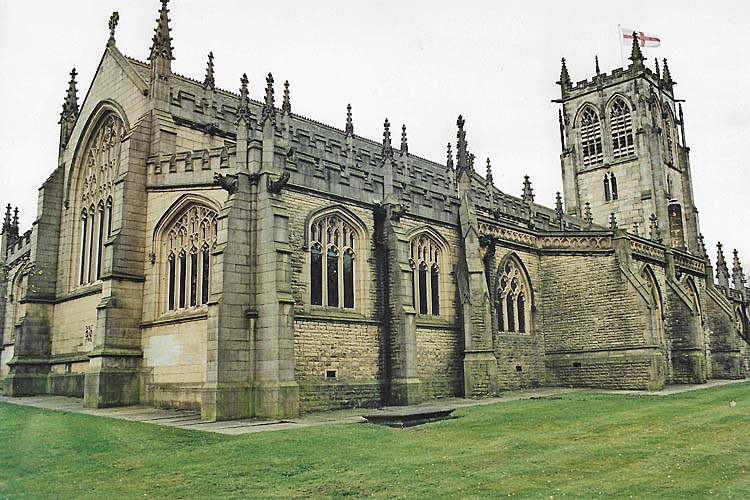
The status as a market
meant that Rochdale became a trading centre for the
predominantly rural population that lived on the
surrounding moorlands. The introduction of sheep into
the local agricultural economy started a woolen
industry founded on farm-based hand spinning and
weaving.
The trading of wool and
cloth took place in public houses throughout the town
on market days. Local weavers produced a range of
woolen cloth including: kerseys, "a coarse
woolen cloth of light weight and often ribbed"; baizes,
"a coarse woolen stuff of plain colour with a nap on
one side, used for table covers"; and most
importantly, flannel, "a soft loosely woven
cloth". Most of the cloth woven in the Parish of
Rochdale went for export to Europe and the Americas.
If Manchester can be hailed as the place where "Cotton
was King", then Rochdale was the place where "Flannel
was King". Cotton didn't become the dominant textile
in Rochdale until 1830.
The change from a
hand-operated cottage-based industry to a
machine-operated factory-based industry brought great
wealth and a lot of misery to the area.
The first textile mills used water-power and in some
cases were converted corn mills located by the rivers
that rushed down off the surrounding hills. The first
chimney went up in Rochdale on Hanging Road in 1791 and
heralded a change to steam power. It was soon joined by
many others and the pollution of the air was only
surpassed by the squalor in which the growing population
lived.
The mechanization of the
woolen industry was slower than the "progress" seen in
cotton. Consequently, the way in which Rochdale
developed was somewhat different from some of its
neighbours to the south and to the north in the
Rossendale Valley.
As the farmer-weavers
upped stakes and moved into town, to take advantage of
the opportunities for trade weavers, cottages sprang
up around Rochdale. Master weavers built these three
storey buildings with a characteristic array of
windows on the top floor. The windows provided the
light required by journeymen weavers, employed on a
piecework basis, who operated the looms located on the
top floor.
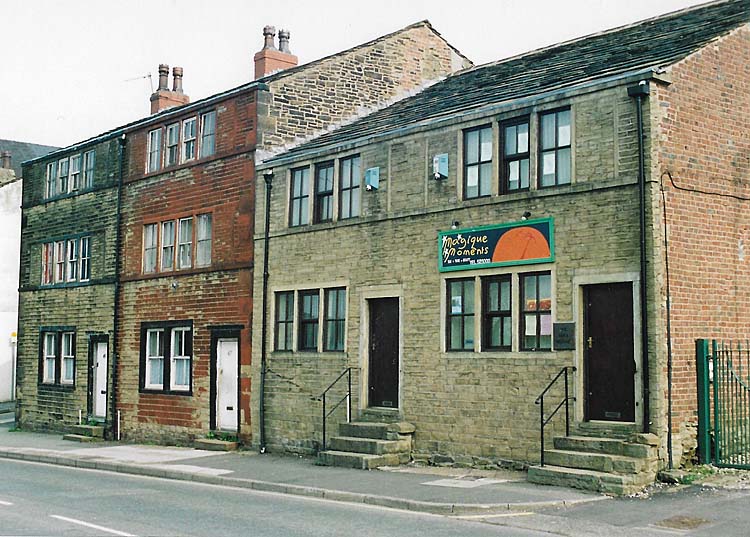
The move
into town saw Rochdale grow from 14,000 in 1801 to
23,000 by 1821.
Chartism
The Struggle for Universal
Sufferage
During the early years
of the 19th century, when Rochdale was thriving as a
textile manufacturing centre, all was not peace and
harmony. At this time the inhabitants of the town and
surrounding area could be divided into three groups or
classes. There were the members of the upper-class,
the wealthy land owners, the Tory gentry, who were
members of the Anglican Church. These people had the
ability to wield real power through their connections
in the church, the magistrature, and by casting a vote
in elections. The middle-class, the nouveau-riche
entrepreneurs who were ambitious, self-made men, saw
themselves as the engines of this economic boom but
completely disenfranchised since they were unable to
vote in elections. Many of the members of this group
belonged to one or other of the diverse non-conformist
churches that had sprung up in the area, Politically,
they were Whigs and later Liberals and they were
determined to wrestle power away from the traditional
ruling class. At the bottom of the heap economically
and politically were the working-class who made up 96%
or the population of Rochdale.
The industrialization of
the textile industry led first to the concentration of
formerly rural people into Rochdale. The population
exploded and by 1841 there were 68,000 people in a
town that just 20 years earlier had 23,000. Living
conditions in the overcrowded, squalid and
increasingly polluted town were dreadful. As
mechanization increased and prices for cloth
fluctuated, the wages paid to factory workers and the
prices paid to independent handweaves spiraled ever
downwards. As local medical practitioners at the time
commented "the labouring classes in the Borough of
Rochdale......are now suffering great and increasing
privations. That they are unable in great numbers to
obtain wholesome food in sufficient quantities to keep
them in health; and that they are predisposed to
disease and rendered unable to resist its
attacks.....In this respect the population amongst
whom we practice are in a much worse state now than
they were five or six years ago."
It was in this climate
that Rochdale as a town developed, and the drama
played out in the meeting halls and on the streets of
the town over several decades. Driven by a thirst for
wealth and power the middle-class clashed on ideologal
grounds with the ruling upper-class Tories. Meanwhile,
the working-class fought to stave off starvation and
learned how to organize their considerable numbers
against the overwhelming power of the rich and
powerful who controlled every aspect of their lives.
The political battle
that ensued at the beginning of the 19th century was
no simple struggle. The often competing goals of the
various classes were inevitably intertwined. I will
endeavour to unravel them but apologize in advance for
any oversimplification.
In 1815 at the Battle of
Waterloo, Napoleon's army was defeated and the Twenty
Years War came to an end. Having won the war, England
faced a serious problem at home. In fact, the country
teetered on the brink of revolution. Even before the
war there had been unrest in the country . It was in
every respect a period of repression in which the
condition of the poor had steadily deteriorated.
Exploited in factories by the new capitalists and on
the land by the old aristocracy, the frustrations of
the poor often manifested themselves in violence,
notably bread riots in Rochdale. In 1791 a riot was
put down by the militia, on the order of magistrate
Thomas Drake, resulting in two deaths. Falling wages
precipitated attacks on weavers' cottages, and in one
incident in 1808, an angry crowd liberated several
men, who had been arrested, and burned down the
"lock-up" on Rope Street. In reaction to the unrest
Rochdale became a barracks town giving it a permanent
military presence ready at a moments notice to put
down any riots.
The move to reform the
existing parliamentary system dominated the political
mood of the country. A party of reform minded men,
equipped with blankets to keep them warm on overnight
stops, set off from Manchester on March 24, 1817 to
present a petition to the Prince Regent in what became
known as the March of the Blanketeers.
The same year a large
political reform meeting was held on Cronkeyshaw
Common outside Rochdale. 35,000 men and women marched
through Rochdale to the Common, and amongst the crowd
at the meeting was Samuel Bamford, a reformer/radical
from Middleton.
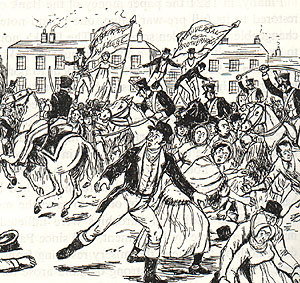
Two years later Bamford
led a party of Middleton people to an assembly on open
ground near St. Peter's Church in Manchester, where
they hoped to hear Henry "Orator" Hunt speak.
"They wore their Sunday
suits and clean neckties; and by the side of fustian
and corduroy walked the coloured prints and stuffs of
wives and sweethearts, who went as for a gala-day, to
break the dull monotony of their lives, and to serve
as a guarantee of peaceable intention. Such at least
was the main body, marshalled in Middleton by
stalwart, stout-hearted Samuel Bamford, which passed
in marching order, five abreast down Newton Lane,
through Oldham Street, skirted the Infirmary Gardens,
and proceeded along Moseley Street. each leader with a
sprig of peaceful laurel in his hat."
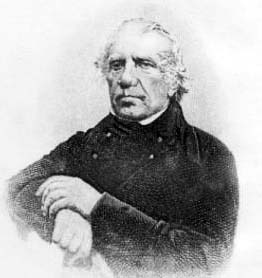
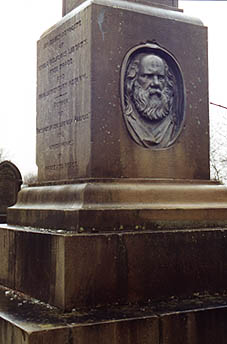
There is a memorial to Samuel NBamford in the
churchyard in Middleton, where he is buried.
Among the throng on St.
Peter's Field it was reported that some banners were
seen saying "Bread or Blood", "Liberty or Death" and
"Equal Representation or Death". Hunt had barely made
it onto the stage when the 15th Hussars, dispatched by
magistrate the Rev. Hay, later the Vicar of Rochdale,
rode, with sabers drawn, into the crowd . Eleven
people were killed and 400 injured in what became
known as the Peterloo Massacre.
The government of the
day finally addressed the parliamentary reform issue
in 1832, by passing the Parliamentary Reform Act.
Unfortunately, for the majority of the people in
Rochdale and around the country nothing changed. The
Act abolished "Rotten Boroughs" and gave their seats
to new towns including Rochdale. It extended the
franchise but only on the basis of wealth to £10
householders in boroughs and £50 tenants in the
counties. In Rochdale this meant that 687 out of a
population of 28,000 could now vote.
Rightly or wrongly, the
mass of the working-class saw the right to vote as a
chance to influence government policy (something that
continues to be almost impossible, even with universal
sufferage) and to improve their miserable lot. A
national movement known as Chartism grew up to address
this working-class discontent. It derived its name
from the six point charter that set out the demands of
the organization, demands which some were prepared to
back with force if necessary:
1. Universal (male) sufferage.
2. Annual Parliaments.
3. Vote by (secret) ballot.
4. Abolition of property qualifications for M.
P.'s.
5. Payment of M. P.'s.
6. Equal Electoral Districts.
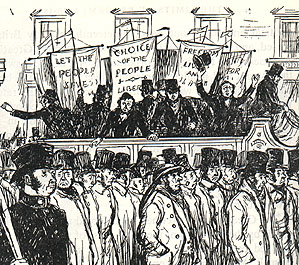
In Rochdale one of the
prominent figures in the Chartist movement was Thomas
Livsey. Livsey was a local lad, the son of a
blacksmith, who was educated until the age of 15 in
Rochdale. Livsey also worked locally on such issues as
shortening working hours in the mills, restricting
child labour and fighting the Poor Laws that
introduced the despised workhouses. Livsey was an
affective interlocutor between the middle-class and
the working-class and a strong advocate for the
latter. He was also involved in the development of the
local Co-operative movement.
The struggle for
acceptance of the Charter raised passions and for a
while there were real concerns that it could lead to
an armed insurrection. Plans to organize a period of
sustained protest across the country in 1839 collapsed
in disarray. By 1842 when the Charter was still a
dream, it began to be apparent to a lot of people that
the way forward for working-class people lay not in
electoral reform but in self-improvement, a decision
which in Rochdale led to Co-operation.
The middle-class fought
for parliamentary reform because they wanted to have
access to the power that the Tory gentry had by right.
The only way to achieve the change they wanted was to
create a ground swell of discontent and to do this
they needed to enlist the support of the
working-class. The working-class joined the frey in a
desperate attempt to give some strength to their
demands for improved living and working conditions.
Throughout this whole period, life and work in
Rochdale was characterized by riots and strikes over
food shortages, pay and working conditions.
Labour Strife
The Struggle for a Living
Wage
There were a number of
contentious issues on the increasingly industrial
scene in Rochdale around which disagreements raged.
The first was the wage rate. After drawn-out
negotiations a complicated system of payments was
agreed in Rochdale. Known as the Statement Price it
was settled in 1824. However, from that point on,
wages entered a downward spiral that sparked-off a
series of strikes and other labour actions.

Another highly
contentious issue was the practice of some employers
to pay their workers in kind. Using what were known
as Truck Shops workers took their pay in food and
goods. The goods were expensive meaning that the
worker saw very little return for his or her sweat.
Worse than that, they were often rotten or
adulterated, with chalk added to the cheese, white
sand in the sugar and mud in the coffee.
There was, of course,
the problem of mechanization. The replacement of
workers by machines was a major issue in 19th
century Rochdale, and continues to affect
management-worker relationships around the world to
the present day. Rochdale, with its emphasis on wool
rather than cotton, was somewhat slower to introduce
highly mechanized production and relied for much
longer than other Lancashire textile towns on
hand-weaving, for instance. The new machinery became
the target of attacks from frustrated hand-weavers
who saw the price they were being paid fall
dramatically.
Rochdale weavers
fought an ongoing battle during the early decades of
the 19th century just to hold on to what they had,
in terms of living and working conditions, and to
stave-off the efforts of their employers to
introduce changes which eroded them.
From 1801 until 1824
it was illegal for workers to form trade unions. In
1824 the weavers and spinners in Rochdale, both men
and women, formed the Rochdale Journeyman Weavers'
Association.
It wasn't long after
the Association was formed that the attacks on the
Statement Price began. Over the coming years the
workers employed various strategies to combat their
employers. When two mill owners began to undercut
both wages and prices, the workers convinced twelve
other employers to stand with them. The dissenting
mills actually took on the workers who struck the
two undercutting mills. In the end, the workers
earned a reinstatement of the rate and forced the
two mill owners to contribute to the union's strike
fund.
Forcing divisions
between employers came to a swift end and, in fact,
the mill owners began to forge their own alliances.
The union countered this by seeking the financial
support of Rochdale's retail traders. To achieve
this they made it quite clear that to not support
the union would result in a boycott of the offending
business.
The union assiduously
denied its part in the workers' action against mills
that were introducing mechanization. In May of 1829
twenty workers, involved in an attack on a mill,
were arrested. A mob attacked the Rochdale jail
where they were being held. Ten people died when the
troops guarding the jail opened fire.
By 1830 wages in
Rochdale were about 40% below the 1824 rate and a
general strike broke out involving six to seven
thousand workers. In June of that year John Doherty,
of the National Association for the Protection of
Labour, made an appearance in town. His address was
so convincing that the spinners and weavers voted
unanimously to join his national union. However, the
promised advantages of belonging to a powerful
national association soon proved to be unfounded.
When it became clear that Doherty's words were not
backed by effective action, and when it was revealed
that the Rochdale subscriptions to the union had
been embezzled, the association came to an end.
Things were to get
worse. By the time the dreadful winter of 1841 hit,
the Rochdale workers were trying to cope on
one-third of the average wage for working people.
Strikes broke out again in August of 1842. Strikers
moved in groups from town to town bringing
production to a standstill by pulling the plugs on
the steam boilers in the mills. They became known as
"Plug Dragoons". In the end, though, starvation
forced the strikers back to work.
Co-operation
It would be reasonable
to ask how, out of all this chaos, mistrust, ill
treatment and double-dealing, Rochdale could be
regarded as the home of Co-opertion. The fact is
that it was this very chaos which stimulated some
people in Rochdale to look for a different way. It
had become clear to working people in Rochdale and
their enlightened supporters among the middle-class
that, if things were going to get better, they could
not expect help from either the government or their
capitalist employers. The government was resisting
all efforts towards universal sufferage and the
capitalists were insulating themselves against the
boom and bust nature of the marketplace by squeezing
their workforces. The way forward for working people
lay in self-improvement. The workers needed to build
associations that would provide them with education
and improved living conditions.
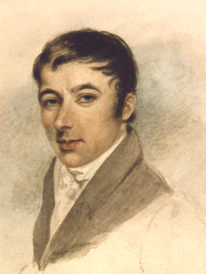
Robert Owen was born
in 1771 in Newtown in Wales. At the age of 16 he
moved to Manchester to take up a position with a
wholesale and retail drapery business. Owen was a
fast mover. At the age of 19 he borrowed £100 to set
up a company to manufacture spinning mules. Two
years later he moved on to become manager of
Drinkwater's large spinning factory in Manchester.
Exercising the 18th century equivalent of
"networking", he got to know David Dale the owner of
the Chorton Twist Company in New Lanark, Scotland,
at the time Britain's largest cotton spinning
business. The two men became good friends and in
1799 Owen married Dale's daughter. With financial
assistance from other Manchester business men, Owen
paid Dale £60,000 for his four textile mills in New
Lanark.
Here is where Owen's
reputation as a social engineer began. He was of the
opinion that all people were basically good and that
the more negative aspects of their behaviour were
forced upon them by the difficulties they faced in
life. He believed that in the right environment
people would be rational, good, and humane. He also
saw education as a vital part of this process. In
his New Lanark mills he changed the practice of
children as young as 5 working 16 hours days. He
introduced a minimum age of 10 and provided nursery
and infant schools for the under 10s. He also
provided a secondary school for his older child
employees. He banned physical punishment in the
mills and the schools.
Owen travelled the
country talking about his ideas, wrote books and
even sent his proposals on factory reform to
Parliament. He advocated the setting up of new
communities, which he called "Villages of
Co-operation". He believed that in time such a
movement would eliminate capitalism and replace it
with a "Co-operative Commonwealth".
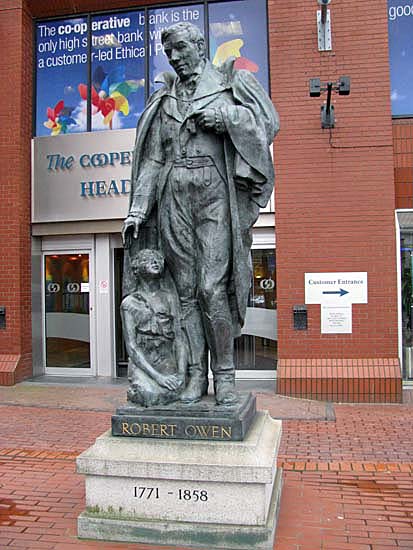
Robert Owen was a very
influential figure in a Britain in which
trade-unionism and Co-operative movements were
developing. However, his wasn't the only voice. Dr.
William King of Brighton was a Co-operator but his
views were somewhat different from Owen's. He saw a
Co-operative store as central to a process that
would provide the working-class with an opportunity
to help themselves. He was proposing a shop that
would sell a limited number of products to members
of a co-operative. As profits provided capital, it
would be used to subsidize production of products by
members. Eventually, this would lead to the
establishment of factories and hence Owen's
Co-operative Commonwealth.
In 1832 the weavers
founded the Rochdale Friendly Co-operative Society
and in 1833, inspired by the enthusiasm for Owen's
ideas, they actually opened their own shop at 15
Toad Lane. This first shop only lasted two years
before it was forced to close.
In 1844 the Rochdale economy was in another of those
dizzying nose-dives that once again led to wage
reductions which in turn triggered strikes.
Unemployed weavers meeting at the Socialist
Institute and no doubt debating Chartist and Owenism
philosophies established a new society.
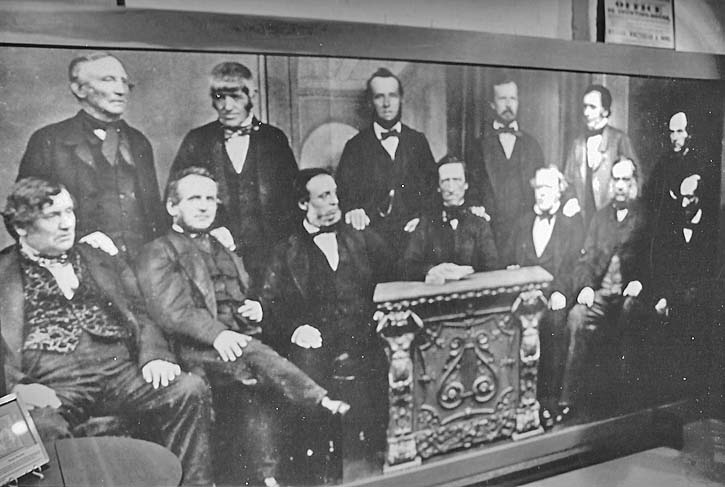
These Rochdale Pioneers
formulated the Rochdale Principles upon which their
version of co-operation were founded. These
principles were:
1.
Democratic control, one member one vote and equality
of the sexes
2. Open membership.
3. A fixed rate of interest payable on investment.
4.
Pure, unadulterated goods with full weights and
measures given.
5. No credit.
6. Profits to be divided pro-rata on the amount of
purchase made (the divi).
7. A fixed percentage of profits to be devoted to
educational purposes.
8. Political and religious neutrality.
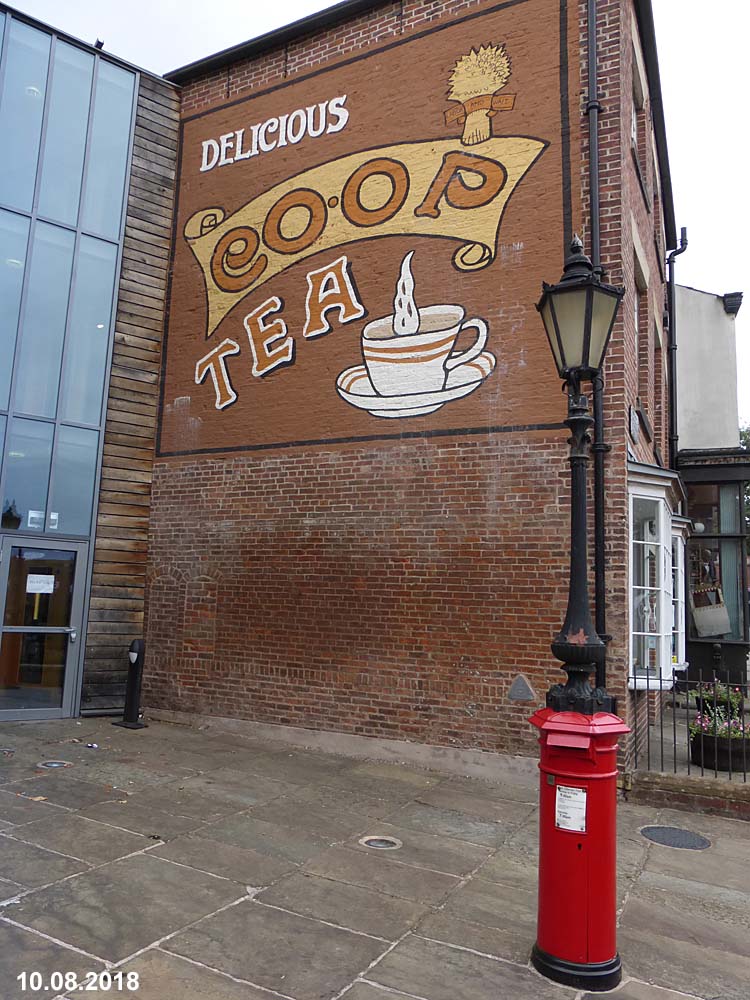
With money raised from
the original 28 subscribers, a shop was founded in a
warehouse at 31 Toad Lane and it was equipped and
stocked. The shop opened on the 21st of December,
1844. By 1848 the Co-operative had 140 members.
However, when the Rochdale Savings Bank collapsed in
1849, due to the fact that one of its underwriting
mill owners George Howarth had embezzled the funds
to prop up his own failing business, people turned
to the Rochdale Equitable Pioneers Society so that
their money would be in safe hands. The society's
membership went up to 390 that year, but by 1860 it
had sky-rocketed to 3,500.
The Rochdale style of
consumer Co-operative became the norm and the model
for others to follow. The principles were applied in
neighbouring towns and then across the country. By
1880 the national membership of consumer societies
had reached over a half a million people and by the
turn of the century 1.5 million.
